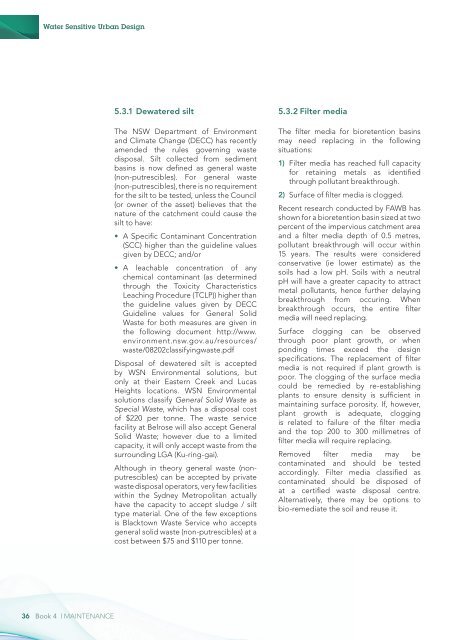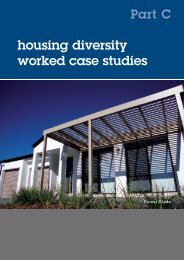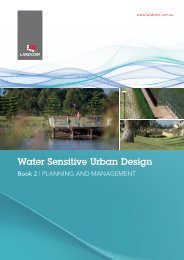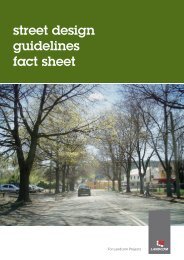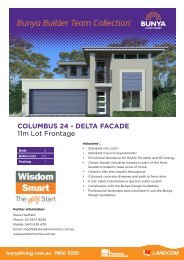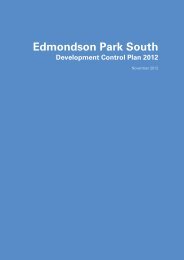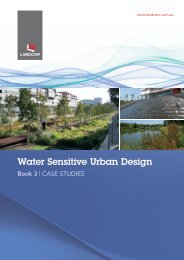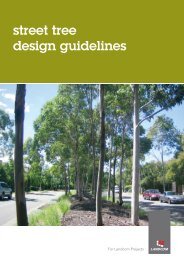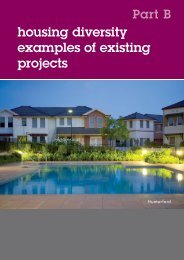Landcom Book 4 Maintenance - WSUD
Landcom Book 4 Maintenance - WSUD
Landcom Book 4 Maintenance - WSUD
Create successful ePaper yourself
Turn your PDF publications into a flip-book with our unique Google optimized e-Paper software.
Water Sensitive Urban Design<br />
5.3.1 Dewatered silt<br />
The NSW Department of Environment<br />
and Climate Change (DECC) has recently<br />
amended the rules governing waste<br />
disposal. Silt collected from sediment<br />
basins is now defined as general waste<br />
(non-putrescibles). For general waste<br />
(non-putrescibles), there is no requirement<br />
for the silt to be tested, unless the Council<br />
(or owner of the asset) believes that the<br />
nature of the catchment could cause the<br />
silt to have:<br />
••<br />
A Specific Contaminant Concentration<br />
(SCC) higher than the guideline values<br />
given by DECC; and/or<br />
••<br />
A leachable concentration of any<br />
chemical contaminant (as determined<br />
through the Toxicity Characteristics<br />
Leaching Procedure (TCLP)) higher than<br />
the guideline values given by DECC<br />
Guideline values for General Solid<br />
Waste for both measures are given in<br />
the following document http://www.<br />
environment.nsw.gov.au/resources/<br />
waste/08202classifyingwaste.pdf<br />
Disposal of dewatered silt is accepted<br />
by WSN Environmental solutions, but<br />
only at their Eastern Creek and Lucas<br />
Heights locations. WSN Environmental<br />
solutions classify General Solid Waste as<br />
Special Waste, which has a disposal cost<br />
of $220 per tonne. The waste service<br />
facility at Belrose will also accept General<br />
Solid Waste; however due to a limited<br />
capacity, it will only accept waste from the<br />
surrounding LGA (Ku-ring-gai).<br />
Although in theory general waste (nonputrescibles)<br />
can be accepted by private<br />
waste disposal operators, very few facilities<br />
within the Sydney Metropolitan actually<br />
have the capacity to accept sludge / silt<br />
type material. One of the few exceptions<br />
is Blacktown Waste Service who accepts<br />
general solid waste (non-putrescibles) at a<br />
cost between $75 and $110 per tonne.<br />
5.3.2 Filter media<br />
The filter media for bioretention basins<br />
may need replacing in the following<br />
situations:<br />
1) Filter media has reached full capacity<br />
for retaining metals as identified<br />
through pollutant breakthrough.<br />
2) Surface of filter media is clogged.<br />
Recent research conducted by FAWB has<br />
shown for a bioretention basin sized at two<br />
percent of the impervious catchment area<br />
and a filter media depth of 0.5 metres,<br />
pollutant breakthrough will occur within<br />
15 years. The results were considered<br />
conservative (ie lower estimate) as the<br />
soils had a low pH. Soils with a neutral<br />
pH will have a greater capacity to attract<br />
metal pollutants, hence further delaying<br />
breakthrough from occuring. When<br />
breakthrough occurs, the entire filter<br />
media will need replacing.<br />
Surface clogging can be observed<br />
through poor plant growth, or when<br />
ponding times exceed the design<br />
specifications. The replacement of filter<br />
media is not required if plant growth is<br />
poor. The clogging of the surface media<br />
could be remedied by re-establishing<br />
plants to ensure density is sufficient in<br />
maintaining surface porosity. If, however,<br />
plant growth is adequate, clogging<br />
is related to failure of the filter media<br />
and the top 200 to 300 millimetres of<br />
filter media will require replacing.<br />
Removed filter media may be<br />
contaminated and should be tested<br />
accordingly. Filter media classified as<br />
contaminated should be disposed of<br />
at a certified waste disposal centre.<br />
Alternatively, there may be options to<br />
bio-remediate the soil and reuse it.<br />
36 <strong>Book</strong> 4 | MAINTENANCE


